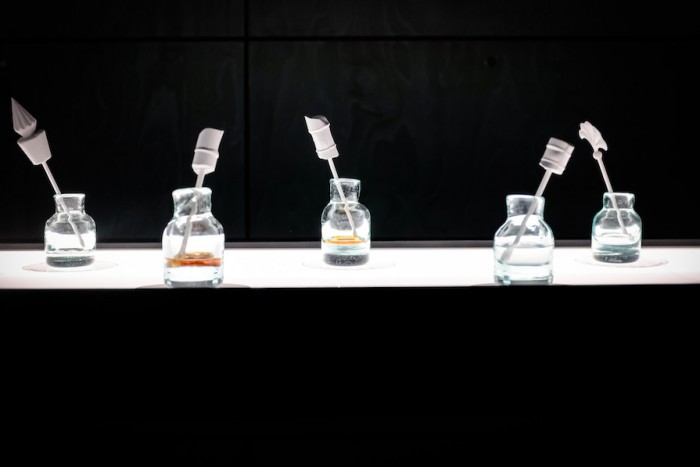Canadian designer Coltrane McDowell creates narratives around smells in his thesis work, An Olfactory Biopolitics: Nairobi. A masters student in Social Design at the Design Academy in Eindhoven, McDowell chose to focus his final project on how scents affect social dynamics in Kenya’s capital city Nairobi.
McDowell is particularly interested in the intersection of community engagement, visual storytelling and a deep understanding of context. His work is heavily researched and tied to history and behaviour economics.
His fascination with smell began when he looked into why certain environments (and by extension the people who occupy them) are perceived as being “clean” while others are perceived as “dirty”, and how manufacturers of industrial cleaning products are able to influence this perception with the scents that were add to the products they sold.

McDowell began to research miasma theory, a medical hypothesis that was dominant until the twentieth century. Miasma theory proposed that diseases were caused by bad quality air, and that both the disease and the cause could be identified by its smell.
During the colonial expansion into African and during the Atlantic slave trade, miasma theory informed an understanding of race and led to racist justifications that still have impact today.
“In present day Nairobi smell is linked to class,” explains McDowell. “It distinguishes those who can access hygiene versus those who can’t; the sort of industries you are involved in to earn your living; and if the work you do is perceived as illegal or immoral.”
McDowell began to make maps of smells across the city and found that there were two areas in particular that were defined by the smell of Nairobi’s home-brewed chang’aa, a very strong liquor that is made by fermenting grains.
Chang’aa was illegal for many years in Kenya and was only legalised in 2010 in an attempt to stop the informal brewers from adding toxic chemicals to make it stronger. It still has a devastating negative health impact on those who drink it; some become addicted, others go blind. It is still widely produced in urban slums.
As he observed the city’s bootleggers and their distillation process, McDowell began to wonder if there was another way they could use their skills and equipment. He worked out that essential oils from flowers could be made in a similar process.
Kenya is one of the biggest exporters of cut roses to Europe. With all the travel restrictions and general disruption that COVID has caused in 2020, flower exports were drastically down and the country’s rose farmers were left with huge amounts of blooms that they couldn’t sell.
He began a project that brought together rose farmers and chang’aa makers to extract rose oils for perfumes, creating a new source of income for both.
Ahead of his antenna talk during Dutch Design Week 2020, we chat to McDowell about his understanding of how design can make an impact on the world and what set him on the trail of reimagining roses and liquor.
Design Indaba: What inspired your project?
Coltrane McDowell: Two things, one was how smell is used in behavioural economics as a means of swaying an individual's emotions to behave in certain ways or make certain choices over others.
The second was the advent of industrial cleaning products at the beginning of the last century, how we have come to understand our immediate environment as ‘clean’, what scents correlate to a clean scent and how this has profound ways on how individuals engage with others who are clean versus perceived ‘dirty’.
What are some other examples of the way smell is used to control behaviour?
Orange scent was used in the Netherlands in a test done in a Rotterdam prison. When the scent was used, people engaged in cleaner behaviours and needed less restraint from officers. In Straumseind in Eindhoven orange scent was used to lower aggression amongst party goers, to the same effect.
Clean scents produce altruistic behaviours. People are more likely to trust you if you smell clean. Foul scents can make people feel less human, like with the Skunk spray used on Palestinian protestors by the Israeli army.
It may sound obvious, but green smells – nature, outdoors etc – also play a pivotal role in mental health. Many people living in marginalised urban settings have limited access to green space and natural scents and this can have profound effects on overall mental wellbeing and cognition.
Were you forced to make any compromises during the process of creating the oils?
I had set out to start a perfume company in Nairobi, comprising essential oil extraction, bottling, promotion and distribution. Many of these initial ideas went on hold or had to be applied in different contexts. These compromises became useful as they extended my initial interest and focus to a broader context, from which I have become fascinated on a much wider network of things.
What are your design ethics?
Humility. Respect. Kindness. And do not make any promises you can’t keep.
Should products always be ‘useful’?
I think usefulness can be understood more broadly than functionality. If a product was the outcome of interesting research that shed light on a given phenomenon, then it was useful, even if the outcome itself was less practical.
What made you decide to study design?
I grew up in Kenya with two parents who work in the NGO development sector. I had my own reservations about humanitarian aid and development work in Kenya, how useful some of the projects that end up getting a lot of funding really are, and what (if any) relationships are built with the people receiving help.
I noticed design was being used in the development sector and thought here was a process that applied creativity and innovation to problems that people have been unable to surpass.
Too often things get passed as innovation when they have just repackaged something. I don’t think any profession has all the answers. All we can do is try, and whether it be design or humanitarian aid, it is another way of looking at the world.
What is your definition of design?
It’s a way of thinking, somewhere between an artist and a scientist. Everything becomes experimentation and play.






